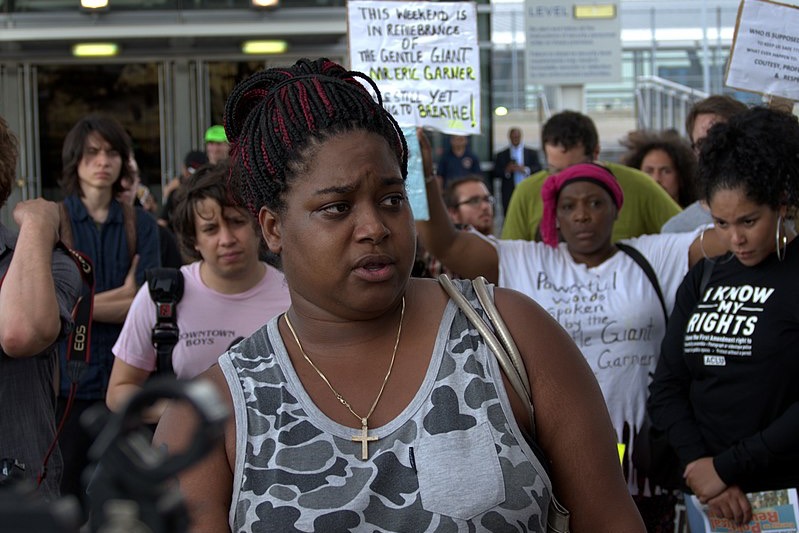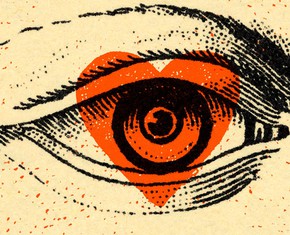The views expressed in our content reflect individual perspectives and do not represent the authoritative views of the Baha'i Faith.
Many of you may know the tragic story of Eric Garner — a 43-year-old African American man who was put in a chokehold by a New York City police officer in 2014. He was heard on video saying, “I can’t breathe” 11 times before he died.
But you may not know the sad fate of his daughter, Erica Garner, who died three years later from brain damage following a heart attack at just 27 years old. She left behind a four-month-old son and eight-year-old daughter.
RELATED: Benevolent vs. Hostile Sexism: Intersection of Race and Gender
Erica Garner was an activist who led a protest march in New York City after a grand jury decided not to indict the police officer involved in her father’s death. Although justice was denied to her family, Erica actively fought for the rights of people of color until the day she died. Weeks before she passed away, she said, “I’m struggling right now with the stress and everything. This thing, it beats you down. The system beats you down to where you can’t win.”

Her sister, Emerald Snipes Garner, spoke of the accumulative stress that led to Erica’s death at a young age. She compared it to playing a game of Jenga where pieces were pulled out of her, ripping her apart, until she collapsed.
Understanding the stress and pain that people of African descent have endured for centuries, Shoghi Effendi, the Guardian of the Baha’i Faith, advised white people in 1938 “to master their impatience of any lack of responsiveness on the part of a people who have received, for so long a period, such grievous and slow-healing wounds.” Baha’is believe that racial prejudice is “the most vital and challenging issue” confronting the United States.
In 1991, the National Spiritual Assembly of the Baha’is of the United States wrote that “the deepening despair of minorities and the poor make the need for solutions ever more pressing and urgent.”
The Mental and Physical Health Effects of Racism
“Racism is a form of violence that is perpetrated and reinforced by institutional power,” wrote Benjamin Aguilera, a behavioral health researcher pursuing a master’s in psychological science, in an email to me.
“This institutional power can be thought of as the practices and policies that allow racism and the effects of racism to persist in our society (segregation, redlining, etc.). When someone commits a racist act, no matter how subtle, they are communicating that they believe you to be inferior solely based on your minoritized racial identity when compared to their white identity. This can be very traumatizing and dehumanizing to people of color and can lead to negative mental and physical health outcomes.”

A meta-analysis of data from 293 studies published between 1983 and 2013 found that “racism can impact health via several recognized pathways: (1) reduced access to employment, housing and education and/or increased exposure to risk factors (e.g., avoidable contact with police); (2) adverse cognitive/emotional processes and associated psychopathology; (3) allostatic load and concomitant patho-physiological processes; (4) diminished participation in healthy behaviors (e.g., sleep and exercise) and/or increased engagement in unhealthy behaviors (e.g., alcohol consumption) either directly as stress coping, or indirectly, via reduced self-regulation; and (5) physical injury as a result of racially-motivated violence.”
Their research found that whether a person of color experienced internalized, interpersonal, or systemic racism, racism was associated with poorer mental health, including depression, anxiety, psychological distress, lower self-esteem and life satisfaction, and poorer physical health.
Dr. Arline Geronimus, a public health researcher and professor, coined the term “weathering” to describe the sense of erosion of a person’s body from constant stress. In an interview with NPR, she shared, “…what I’ve seen over the years of my research and lifetime is that the stressors that impact people of color are chronic and repeated through their whole life course, and in fact, may even be at their height in the young adult-through-middle-adult ages rather than in early life. And that increases a general health vulnerability — which is what weathering is.”
“This chronic stress disrupts the regular cortisol cycle, which could negatively impact sleep, cardiovascular health, blood sugar levels, and the immune system,” explained Benjamin.
“I believe that stress from experiencing racism and discrimination has contributed to health issues I have had throughout my lifetime. I believe that these effects arise from subtle forms of racism (microaggressions) and the accumulative stress that arises from them, systemic injustices such as a lack of generational wealth and healthcare resources, or from more overt forms of racism like when a domestic terrorist opened fire on a Wal-Mart in El Paso, Texas in 2019 while targeting the Latinx community. He killed 23 people.”
How We Can Combat the Mental and Physical Health Effects of Racism
Professor Geronimus believes that it is important for people of color to have access to healthcare to combat these health effects of racism.
“So you may be hypertensive from weathering but if you have good access to healthcare, you get diagnosed early, you get it treated. You learn what you need to do with your diet to make it a little less likely to turn into its more pernicious and life-threatening form. We’ve seen evidence, in some of our studies where we’ve compared Blacks in very high-poverty areas to Blacks in more middle-class neighborhoods, and what we’ve seen is that those in the higher-class neighborhoods do have much longer life expectancy than those in the poor neighborhoods. But they spend most of that extra life with chronic conditions and possibly disabled. Or, with a variety of morbidities than whites with the same incomes and educations, living in the same neighborhoods,” she said.
Engaging in healthy daily practices that reduce stress, such as exercise, prayer, meditation, and artistic forms of expression, are great ways to prevent stress-causing illnesses as well.
Additionally, as a researcher who focuses on health and multicultural psychology, Benjamin examines the “factors that could contribute to resilience when experiencing racism. A few are social support, community resilience, and identity pride. All these factors involve having the resources provided by a supportive community of your peers who understand what you are going through.”
The Baha’i writings say that the “first and inescapable obligation” of the Baha’i community is “to nurture, encourage, and safeguard every minority…” This involves safeguarding marginalized communities from all forms of harm and providing safe, nurturing spaces where victims of oppression can heal, encourage, and empower each other.
“Racism, one of the most baneful and persistent evils, is a major barrier to peace,” wrote the Universal House of Justice, the globally-elected governing council of the Baha’i Faith, in 1985.
“Its practice perpetrates too outrageous a violation of the dignity of human beings to be countenanced under any pretext. Racism retards the unfoldment of the boundless potentialities of its victims, corrupts its perpetrators, and blights human progress. Recognition of the oneness of mankind, implemented by appropriate legal measures, must be universally upheld if this problem is to be overcome.”
Everyone must do their part to promote the oneness of humanity by working to dismantle these oppressive systems and advocate for racial justice and equity in their personal and professional lives. This is necessary for both the peace of individuals and the tranquility of the world.
You May Also Like
Comments

















This is such a difficult and emotive topic on which to write a nuanced, balanced and careful piece.
Also thank you for shedding light on Erica Garner. It's heart-rending to see that emotional labour is never recognised until it is too late.